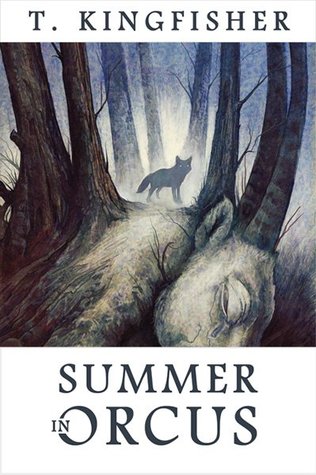She took a step back, knowing that if they came for her, there was no point in running. Her throat and her heart and the nerves along the backs of her arms said we will try to run anyway, and Summer, still in the grip of her strange new emotion, said I know. She found that she loved her heart and her nerves for their willingness to try to save her, even in the face of futility. [loc. 4043]Summer is eleven years old and lives with her mother, who loves her very very much: so much that Summer, offered her heart's desire by the witch Baba Yaga, finds herself wondering if that desire is to be an orphan. She loves her mother, of course, but she isn't allowed to do anything even mildly risky (riding a horse, going on the Ferris wheel, going to a sleepover) because she's all her mother has.
Baba Yaga does grant Summer's heart's desire, but she doesn't tell Summer what it actually is. Instead, Summer finds herself in a mysterious forest, which turns out to be in Orcus. Summer, who has grown up reading a great deal of fantasy (her mother, amusingly, thinks that books are safe) is disappointed not to be met by fauns and presented with a quest. All she has is a nameless, talking weasel.
Summer's adventures in Orcus are highly entertaining. There are three princesses (Boarskin, Bearskin and Donkeyskin); Glorious the wolf, who is a were-creature of an unusual kind; Reginald, who is an aristocrat straight out of a Regency romance (including a flock of valets) but with one major difference; and the fearsome Queen-in-Chains and her seneschal Zultan Houndbreaker, who may know something about 'the cancer at the heart of the world'.
Summer may only be eleven, but her mother's mental health issues have forced her to learn some hard lessons: they turn out to be very useful in Orcus. As do the words in the stained-glass window, in a book that was held by a saint wearing purple sneakers: "Don’t worry about things that you cannot fix. Antelope women are not to be trusted. You cannot change essential nature with magic." Summer also learns that you should be careful what you wish for, and that it's important to be true to your nature (even if your nature is not especially nice).
So many little details in this book! Kingfisher teases with phoenix hedgehogs, real-estate hunters, mouse-trees, the sun's shadow ... and an open ending that is at once satisfactory and leaves the door ajar for more story. I do hope there's more: I'm sure it would be a delight. Though I would be entirely happy to read a novel about this version of Baba Yaga, who snacks on salesmen, who 'sees all the way through time and chews off the bits she doesn't like.'

No comments:
Post a Comment